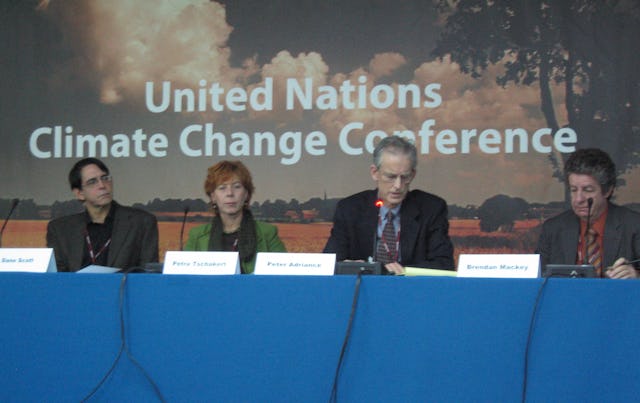Ethics stressed at UN conference on climate change
POZNAN, Poland — In its contributions to the UN Climate Change conference in Poznan, Poland, this week, the Baha’i International Community stressed the importance of addressing the ethical and moral issues that surround global warming and its impact on the world’s peoples.
“The search for solutions to climate change has revealed the limits of traditional technological and policy approaches and has raised difficult questions about justice, equity, responsibility and obligation,” said the BIC in a working paper released at the conference.
Titled “Seizing the Opportunity: Redefining the Challenge of Climate Change,” the paper offers initial considerations from a Baha’i perspective as the world faces the challenge of global warming.
“As communities and policy-makers worldwide have wrestled with these questions, they have brought us all to the threshold of a tremendous opportunity,” said the paper.
“It is the opportunity to take the next step in the transition from a state-centered mode of interacting on the world stage to one rooted in the unity which connects us as the inhabitants of one biosphere, the citizens of one world and the members of one human civilization.” (See BIC paper.)
Representatives of the BIC also participated in two side events at the conference, both of which were likewise aimed at addressing the moral and ethical issues that stem from global warming.
Both events were organized by the Collaborative Program on the Ethical Dimension of Climate Change at the Rock Ethics Institute at Penn State University, and both carried the title “Moral and ethical issues that must be faced in implementing the Bali roadmap.”
On Monday, 8 December, Baha’i representative Peter Adriance spoke on a panel discussion under that title, on the topic “Summoning the courage: Arising to the ethical challenge of climate change.”
In his remarks, Mr. Adriance stressed the importance of embracing the concept of the oneness of humanity as the overriding ethical and moral principle in addressing climate change.
“There is a great opportunity for the world to make the transition from operating only from a national perspective to a global perspective,” said Mr. Adriance.
On Tuesday, 9 December, Baha’i representatives participated in a daylong seminar, also organized by the Collaborative Program on the Ethical Dimensions of Climate Change.
“The work of the United Nations conference is at a crucial point,” said Tahirih Naylor, a Baha’i International Community representative to the United Nations, who headed the Baha’i delegation in Poznan. “And our goal in our contributions here is to encourage world leaders and leaders of thought to include a consideration of the moral and ethical impact of the decisions they are making.
“For example, the principle of justice demands that governments move outside their own limited national interests, and so look at this problem in terms of its global reach and impact. Climate change is a problem of international scope, and it requires a level of cooperation that humanity really hasn’t faced in the past.”
The Baha’i International Community is one of hundreds of nongovernmental organizations attending the two-week Poznan conference, which runs through 12 December.
Starting today, government ministers and other top officials from nearly 200 nations will participate in a two-day, high-level segment aimed at completing key elements of an ambitious global climate change deal next year.
UN Secretary-General Ban Ki-moon is scheduled to address the high-level segment today and will appeal to the gathered leaders to not let the food, financial and other current crises dissuade them from taking urgent action on climate change.
The Poznan conference marks the half-way point in efforts to reach agreement on a successor pact to the Kyoto Protocol, the legally binding regime for reducing greenhouse gas emissions whose first commitment period ends in 2012. The process began in Bali, Indonesia, last year.
